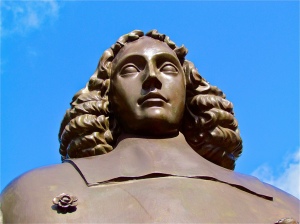Watching the news, reading social media contributions, I more and more come to the conclusion that it might be time to end our persistent liking of this concept, the ideal of freedom of speech. In a world where opinions create problems, perhaps it is time to stop having opinions altogether.
Especially when having an opinion is seen as ‘doing something’, as ‘contributing something’ to society. Thus, the main problem I have with the ‘freedom of opinion’ is that is seems to warrant a liberty through which people feel entitled to say whatever they want, even if it hurts, even if it confirms prejudice and ignorance.
When we take into account that we are mostly limited in our thinking by the world in which we find ourselves, then we must conclude that our opinions can only be a confirmation of who we already are, of what we already know.
Freedom of opinion itself does not lead to less injustice
I have not seen much evidence that the freedom of speech helps to clear up injustice. Complete freedom for everyone to shout whatever they want, actually keeps injustices afloat. As long as the person who shouts loudest, who has the most money, and who has the most people joining them in shouting the same opinion, injustices will not be cleared up. Spinoza would confirm this, as according to Spinoza it is is power that creates rights. Not the other way around, as our democratic governments seem to want to tell us, even though they will do everything in their power, to stay in power and to create the rights by which they can stay in power.
And yes, this is an undemocratic point I’m making. But as long as democracy is more and more declining into a ruling of the uninformed, uneducated, uninterested and shouting masses, the minorities and those who need help will never be heard or helped. So yes, let us not approve of these mechanisms of injustice only because of this illusion of ‘democracy’.
Freedom to think
When we read Spinoza closely, we can see that he is in favour of the freedom of speech, even though it creates horrible situations in which we have to deal with opinions that hurt and are not helpful for society. And we need to accept this, because the alternative is even worse: people being persecuted for what they say by the state or by groups of people. As still happens, notably in Turkey and unfortunately in too many other countries as well – countries that don’t even make the news as this persecution of saying what you think is deemed ‘normal’ enough to not make useful headlines.
But Spinoza does not think that the freedom of speech is the highest freedom. He says freedom is “the freedom to think and to say what we think”. And this ‘and’ should not be taken as a conjunction, but as a disjunction. Or, in other words: these two are related. The highest ideal, as he mentions in the final parts of his Ethics, is our freedom to think, and with thinking he means critical thinking. So critical in fact, that we need to be ready to distance ourselves from the people around us, from those who educated and love us, that we need to be ready for a dosis of nihilism, so that we can leave behind as much thought as we can, and truly think. Think critically.
Something similar was said by Kierkegaard. Yes, since when did the freedom of speech take the role of the ‘freedom to think’? And Kierkegaard, although I could not verify its source (help?), is spot on: “People demand freedom of speech as a compensation for the freedom of thought which they seldom use.”
The freedom to think is not for the masses, according to Spinoza. And perhaps we can understand this, when we look at how dependent our everyday lives are to those around us. There is maybe nothing wrong with this, it is not a value judgement. Even though it is the highest realm we can accomplish as human beings, to think freely, critically, this freedom to think also brings along a lot of responsibility, which not everyone is ready to deal with. It is however the fate of the philosopher.
Perhaps this will make me less upset when all these opinions are flagrantly abused again in politics, on television and everywhere else. To realise the freedom of speech is so much easier to accomplish than the freedom of thought. And how both are so difficult, and each is only valuable in the presence of the other.
Want to read more about this?
- Ethics, Spinoza
- Spinoza – Vijf wegen naar de vrijheid, Maarten van Buuren, Ambo Anthos, 2016.
Photo Credit: Roel Wijnants via Compfight cc.
Dutch version published on filosofischereflectie.com.

Read more short stories by @nobyeni at her website.
Support her philosophical fiction on Patreon or through Steady.
